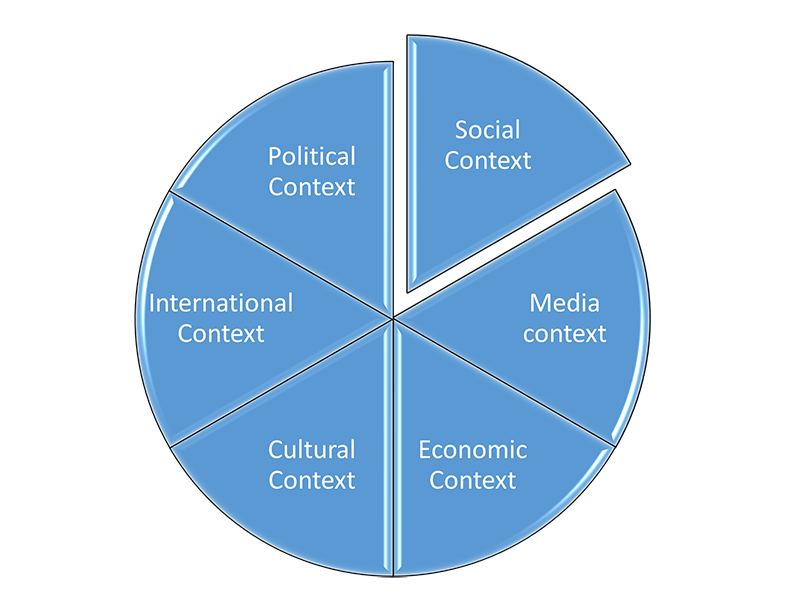4. Contextualising disasters

Return once again to this definition of disasters:
Hazard + Vulnerability + Insufficient Response = Disaster
It is important to remember that the hazard is only one part of what makes up a disaster, be that a storm, terrorism, landslide etc. The disaster is created by the wider context, most notably the vulnerability to that hazard, and the insufficient response when hazard is apparent. Frequently then, social workers are typically not directly responding to the hazard itself, but addressing the vulnerability and making up for the insufficient response.
Therefore, social workers must have an understanding of the wider context of what caused a disaster, including the social, political, economic and environmental structures and systems (Pyles, 2017). This will be unique to every disaster, but the list below highlights some of the key areas to be aware of and has examples of questions social workers should be asking themselves and others:

Political context:
What are the likely ramifications for the ruling political leaders? What actions might they take to save face? Whose interests are they likely to protect?
International context:
Are there international organisations/countries involved in the disaster response/recovery? What interests/values do they bring with them? Who is financing them?
Cultural context:
What are the cultural needs of those impacted by the disaster? How likely are these to be met by disaster responses/plans? Who needs to be engaged to highlight these cultural needs?
Economic context:
Where is money for the response/recovery coming from/going to? Who is being impacted the worst financially, and who is being saved from that impact? Where does funding need to go to address those impacted by the disaster?
Media Context:
What views are mainstream media outlets prioritising in their coverage? Whose views are being ignored? How can media (including social media) be used to improve the disaster response/recovery?
Social context:
What has been the impact on marginalised communities? Are they having their voices heard? How can social workers advocate for those impacted? What has been the impact on the local environment that people rely on?
Social workers must also understand their own context. As highlighted in a previous section, the governance of social workers during a disaster situation is devolved to individual local authorities. In the event of a disaster, local authorities are therefore reliant on the “spare” capacity of social workers to respond. This approach has been adopted largely so as not disrupt the everyday commitments of social workers in already stretched local authorities. However, the reality that this “spare” capacity exists has been challenged, most notably due to increasing cost-efficiency and austerity pressures (Dominelli, 2020). This also means that capacity to respond to disasters varies significantly across the country and relies on trained volunteers and local authorities’ willingness to implement necessary secondments (Eyre, 2008).
The paragraphs below identify some of the contextual factors that were relevant to the Manchester Arena Bombing that social workers would have needed to account for/understand.
Preparation
There was initial confusion in the health and social care response to the incident, as highlighted in the Kerslake Report. More co-ordinated planning and preparation could have therefore improved the response provided.
Response
Many of those impacted came from different parts of the country to attend the concert, meaning the response had to involve a large number of local authorities. Not all of these would know that someone returning from the concert lived in their area.
Recovery
The bombing was perpetrated by a suicide bomber claiming to support extremist Islamic beliefs, and this led to an increase in Islamophobic political discourse and hate crimes perpetrated against Muslim populations throughout England.
Complete short task 5 in workbook (15 minutes)
Case Study: The Troubles
The troubles refers to the 30 year period of ethno-nationalist sectarian conflict between two populations in Northern Ireland, commonly referred to as nationalist republicans (mainly self-identifying as Irish or Catholic) and unionist Loyalists (mainly self-identifying as British or Protestant). Over 3,600 people died and approximately 40,000 were injured during this period.
The deep rooted historical, socio-political, geographical, economic and cultural context of the troubles make it a unique kind of disaster for the UK. This context shaped social work practice during the troubles, and in the aftermath. The BASW report Voices of Social Work through the Troubles 2019 highlights the experiences of social workers working during this period, and the issues they faced including:
- Less than half of social workers reported receiving support from their employer when they experienced violence:
After one incident, where I was threatened by a group of masked paramilitaries, my line manager instructed me to return to the same house the following day.
- The importance of peer support:
You debriefed with your colleagues when you came back, largely informal peer support.
- The need for creative practice:
Our employer issued any professional who wished an armband indicating that we were essential services so that we could more easily pass through paramilitary roadblocks.
- A lack of training/education in how to manage these issues:
We were in the midst of The Troubles and it was all too painful to deal with in a class of people from different backgrounds
- A culture of ‘getting on with it’ and not addressing the context:
The trauma of living in besieged communities was not spoken about openly in the staff team let alone with the families. It was a known but an unspoken truth with a focus on normalisation.
- Lasting impact/legacy of the experience:
Direct experiences of threat to me were profoundly frightening—as much for the threat they posed to my family and colleagues, as to me. This deeply affected my mood and behaviour at times.
It has made me very resilient, I can manage high levels of stress, I am not afraid of conflict and can mediate well in these situations.
The full report can be read here. Is there anything from your own experience or working that you see reflected in any of these quotes?
Section links
- Disasters and the law introduction
- Civil Contingencies Act 2004
- Advocating for the role of social workers in disasters
- Contextualising disasters (current page)
- Disaster capitalism
- Follow up task
